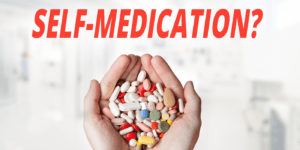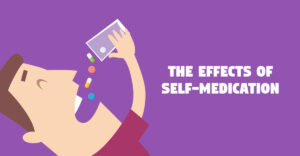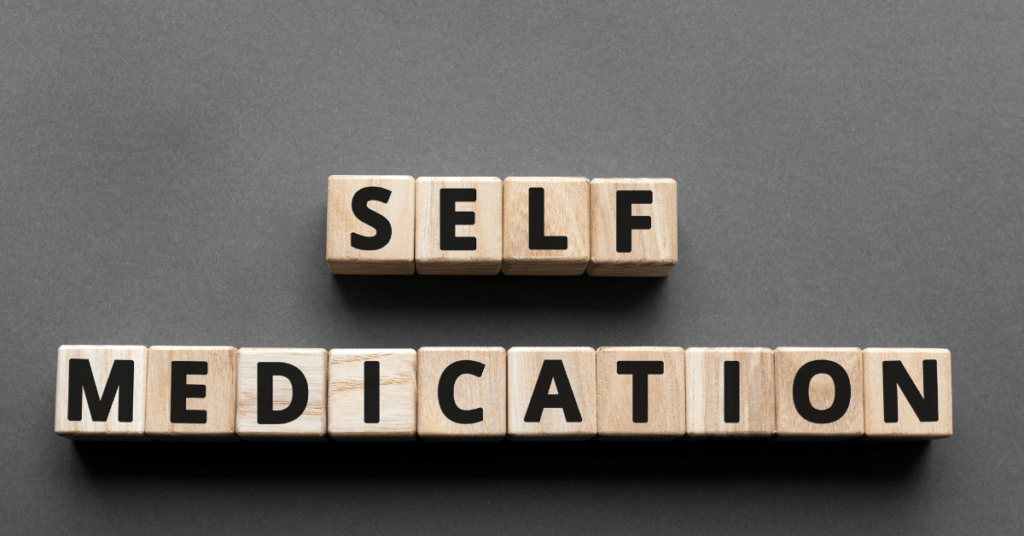Contents
What Is Self-Medicating?

Self-medicating is when people use the medication in a way that is not advisable. For example, when someone takes too much medication, it’s self-medication. People who self-medicate may also engage in risky behaviors when they are feeling down or anxious.
It is well known that people use drugs and alcohol to numb the pain of what they are feeling. But there are other ways to self-medicate, including overeating or binge eating. The problem with these methods is that it does not provide a lasting solution for emotional problems, just like using drugs or alcohol does not provide long-term relief.
Self-medicating in this way can lead to weight gain which leads to depression and anxiety-inducing feelings in the person who was already feeling bad about their body image. This also leads to an increase in health problems such as diabetes and high blood pressure when combined with the excess weight gained from overeating or binge eating.
The best way to stop self-medicating through food is by getting help. This can be done through therapy, medication, or a support group. These things will help to address the emotional issues that are causing the person to self-medicate in the first place.
It is important to note that self-medicating is not only a problem with food. It can also involve drugs, alcohol, sex, and other risky behaviors. But talking to a therapist and finding out the underlying cause of the self-medication is important for lasting recovery from this disorder.
How Does It Happen?
Self-medication happens when people use drugs or alcohol to try and numb the pain of what they’re feeling. This can be done in a variety of ways, including overeating or binge eating. The problem with these methods is that they do not provide a lasting solution for emotional problems. Just like using drugs or alcohol does not provide long-term relief, self-medicating in this way can lead to weight gain which leads to depression and anxiety-inducing feelings in the person who was already feeling bad about their body image. This also leads to an increase in health problems such as diabetes and high blood pressure when combined with the excess weight gained from overeating or binge eating.
There are a variety of reasons why people may self-medicate. Some may do it to try and numb the pain of what they’re feeling, while others may do it to try and feel better. People who self-medicate may also have an addiction to the drug or alcohol that they’re using.
Effects Of Self-medicating

Self-medicating can have a number of negative effects on both the body and mind. For example, self-medicating through food can lead to weight gain which leads to depression and anxiety-inducing feelings in the person who was already feeling bad about their body image. This also leads to an increase in health problems such as diabetes and high blood pressure when combined with the excess weight gained from overeating or binge eating.
Self-medicating can also lead to addiction. Drugs, alcohol, sex, and other risky behaviors can all be addictive. When someone is addicted, they cannot control their use of the substance and it becomes a problem in their life. They also need more and more of the substance to achieve the same effect, which can lead to overdose.
Signs Someone May Be Self-medicating
 Some signs that someone may be self-medicating through food or other risky behaviors include:
Some signs that someone may be self-medicating through food or other risky behaviors include:
1. Overeating or binge eating
2. Using drugs or alcohol to numb the pain
3. Engaging in risky behaviors such as sex or gambling
4. Having a hard time controlling their use of the substance
5. Experiencing negative consequences as a result of their drug or alcohol use, such as job loss, financial problems, or health problems
6. Using drugs or alcohol more than intended
Forms Of Self-medication
There are a variety of forms that self-medication can take. These include alcohol, drug abuse, eating disorders such as overeating and binge eating, and other risky behaviors such as sex and gambling.
Alcohol
Many people use alcohol to self-medicate. This can be because alcohol is a depressant and it numbs the pain that someone is feeling. It can also be because alcohol is an addictive substance and it provides a high that the person may be looking for.
Drug Abuse
People may also use drugs to self-medicate. Drugs are often used because they make the person feel good, high, or numb to what they’re feeling. People turn to drugs for this reason because it’s an easy way to get rid of pain or other negative feelings that somebody is experiencing at the time. Like alcohol, drugs are also addictive and it becomes increasingly difficult for someone who is addicted to stop using them.
Eating Disorders
People who have eating disorders such as overeating and binge eating may use food to self-medicate. They may do this because they are trying to fill a void that is left by not using drugs or alcohol. They may also be using food to try and control their emotions. Eating disorders can be very dangerous because they can lead to life-threatening health problems.
Risky Behaviors
People who are using sex, gambling, or other risky behaviors as a way to self-medicate may do so because these activities also provide feelings of excitement and pleasure that drugs and alcohol cannot provide. However, like with drugs and alcohol, engaging in risky behaviors can also lead to addiction. This means that people may begin to engage in the behavior more frequently and the consequences of this behavior become more severe over time.
What Happens When Someone Self-medicates?

When someone self-medicates, they may use drugs or alcohol to numb the pain or overeat or binge eat in order to temporarily feel better. This is what people mean by “self-medicating.” The problem with these methods is that they don’t last and the person who was using them anyway will likely just try something else to cover up their emotional problems even though they haven’t really dealt with the root of the problem.
Dangers Of Self Medication
One of the main dangers of self-medicating is that it can lead to addiction. As people begin to use the drug or alcohol more and more, they may not be able to stop and will need professional help in order to get sober again. They also may experience withdrawal symptoms when they don’t use the drug or alcohol and feel very sick and uncomfortable. This can be a dangerous state for someone who has relied on this substance for emotional relief.
Make symptoms worse
Another danger of self-medicating is that it can actually make the symptoms worse. If someone is using drugs or alcohol to deal with emotional problems, these substances may actually aggravate the symptoms. This can lead to even more problems for the person who is already struggling.
Trigger new mental health problems
In addition to this, when someone uses drugs or alcohol they can experience a blackout state. In this state, the person is completely out of control and may behave in ways that they later regret. They may also do things that make them feel ashamed or embarrassed when they come back to their senses. This type of behavior can trigger new mental health problems.
Ways To Recover From Self-Medication Disorders
 Self-medication disorder is a condition where someone uses substances such as alcohol, drugs, or food as a way to cope with difficult emotions they are experiencing. People who use these substances to self-medicate often do not realize that they have a problem. They may feel like they are just using the substance in a healthy way, but in reality, the substance becomes a crutch and it begins to control their life.
Self-medication disorder is a condition where someone uses substances such as alcohol, drugs, or food as a way to cope with difficult emotions they are experiencing. People who use these substances to self-medicate often do not realize that they have a problem. They may feel like they are just using the substance in a healthy way, but in reality, the substance becomes a crutch and it begins to control their life.
People who are dealing with self-medication disorder often have difficulty controlling their use of the substance. They may intend to only use it once in a while, but the substance becomes more important than anything else and they use it regularly.
They may also experience negative consequences as a result of their drug or alcohol use. These include job loss, financial problems, or even health problems. If someone is experiencing these types of issues, they may need to seek treatment for self-medication disorder.
Rehabilitation Program
The main way that people can stop their drug or alcohol use is by entering a rehabilitation program. This can help them to stop using the substance and begin working on the underlying issues that made them reach for drugs in the first place. If someone has an eating disorder, they may also need to seek treatment for that.
Talk To A Therapist
The best way to stop self-medicating through food is by getting help. This can be done through therapy, medication, or a support group. These things will help to address the emotional issues that are causing the person to self-medicate in the first place. It is important to note that self-medicating is not only a problem with food. It can also involve drugs, alcohol, sex, and other risky behaviors. But talking to a therapist and finding out the underlying cause of the self-medication is important for lasting recovery from this disorder.
Self-medication disorder can be a difficult condition to deal with, but it is possible to get help. Talking to a therapist and finding out the underlying cause of the self-medication is important for lasting recovery from this disorder. There are a variety of treatments available that can help people manage their emotions in a healthier way.
Medication
If someone is using drugs or alcohol to self-medicate, they may need to take medication to help them stop using the substance. This medication can help to ease the withdrawal symptoms that occur when someone stops using drugs or alcohol.
Support Groups
There are also support groups available for people who are struggling with self-medication disorder. These groups allow people to meet other people who are also struggling with this condition. They can provide support and coping skills that can help someone stop self-medicating.
When To Seek Help?
 It is important for people who are self-medicating to seek help in order to stop this harmful behavior. It may be difficult at first, but the right treatment will completely change a person’s life and allow them to manage their emotions in a positive way. When people do not get the treatment that they need, they may end up in jail, fired from their job, or homeless.
It is important for people who are self-medicating to seek help in order to stop this harmful behavior. It may be difficult at first, but the right treatment will completely change a person’s life and allow them to manage their emotions in a positive way. When people do not get the treatment that they need, they may end up in jail, fired from their job, or homeless.
There are many reasons why someone should seek professional help when they are self-medicating. Of course, there is the addiction aspect of this problem. But oftentimes people who self-medicate also have underlying mental health problems. This means that their drug or alcohol use is not just a bad habit, but also symptomatic of something more serious. Sometimes people are self-medicating in place of seeking treatment for other mental health problems. This can lead to increased frustration which can contribute to addiction because the person feels they have nowhere else to turn.
Conclusion
Antidepressants are one of the most commonly prescribed drugs in America, but what if they’re not the right solution for you? Talk to your doctor about alternatives like therapy or counseling. You can also try self-medicating with activities that relax and de-stress you – cooking a healthy meal, getting some exercise, reading an entertaining book. But be warned: these approaches may take longer than medication to produce results.
If you are looking for affordable Online Counseling MantraCare can help: Book a trial therapy session


